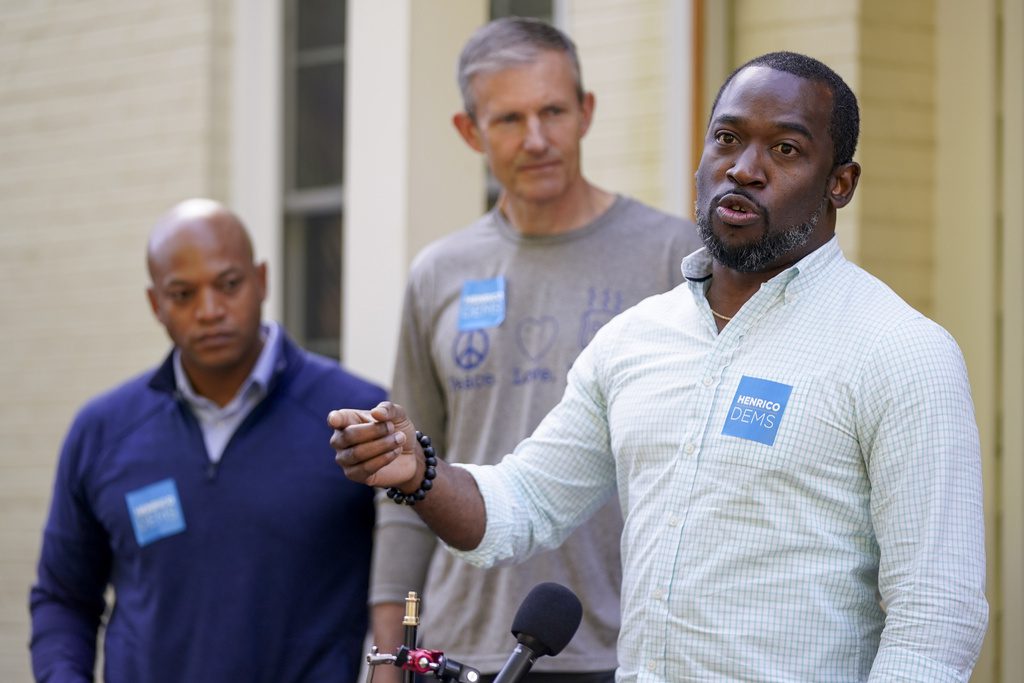
Rep. Jim Jordan, R-Ohio, chairman of the House Judiciary Committee leaves the Republican caucus meeting at the Capitol in Washington, Thursday, Oct. 19, 2023. (AP Photo/Jose Luis Magana)
Congress is in gridlock as Republicans are now in their third week of being unable to elect a new House Speaker after a far-right group of conservatives forced a vote to oust former leader Kevin McCarthy (R-California).
What’s happening with efforts to find a new leader of the US House?
Since McCarthy’s removal, not a single Republican lawmaker has been able to get the number of votes necessary to become House Speaker—the person tasked with leading the House and essentially overseeing the legislative process.
How many votes does it take for a person to become Speaker of the House?
It usually takes 218 votes—a simple majority of the 435 members of the House—to become House Speaker, but due to two vacancies in the House right now, only 217 votes are needed.
Both of the major political parties nominate one candidate for the position of Speaker, and the candidate from the majority party usually wins.
Why have lawmakers struggled to elect a new Speaker?
Since Republicans hold the majority, the task essentially falls to them to decide who should lead the House. But over the past two weeks, the party’s various factions have attacked each other publicly and privately over McCarthy’s ouster and their disagreements over who should lead the party.
As the GOP’s infighting continues, the House remains without a speaker as wars escalate in the Middle East and Ukraine, and the US government faces a possible shutdown in just four weeks.
So who’s in the running?
Two different conservative candidates—Louisiana congressman Steve Scalise and Ohio lawmaker Jim Jordan—have been selected as possible nominees in recent weeks, only for each of them to fail to secure enough support among fellow Republicans to win the speakership.
Scalise and Jordan’s failures to win over enough of their peers comes in part due to their controversial records.
Scalise once called himself “David Duke without the baggage,” referring to the white supremacist and KKK member from his home state. Jordan, meanwhile, has been credibly accused of ignoring claims of sexual abuse during his time as an assistant wrestling coach at Ohio State University in the 1980s and 90s and was one of the most active participants in Donald Trump’s effort to overturn the 2020 presidential election.
Jordan has undertaken an aggressive public and private pressure campaign to try and persuade his detractors, but those heavy-handed tactics have backfired, angering many of his fellow conservatives and leading at least two Republicans to get death threats from voters.
Jordan lost 22 Republican votes during his second attempt to win the speakership on Wednesday, before vowing Thursday to try again a third time.
Democrats, meanwhile, have voted to support House Minority Leader Hakeem Jeffries each time. They’ve also shown a willingness to partner with moderate Republicans to empower acting speaker pro tempore Patrick McHenry (R-North Carolina)—who can currently only preside over floor debate and voting for a new speaker—and give him temporary authorities to help the House emerge from its current paralysis and once again consider certain legislation.
But Jordan and some other Republicans have ruled out the idea of compromising or working with Democrats, even as they have proven to be utterly unable to select a leader—a basic first step in governance.
What’s next?
No one knows.
Politics

Biden administration bans noncompete clauses for workers
The Federal Trade Commission (FTC) voted on Tuesday to ban noncompete agreements—those pesky clauses that employers often force their workers to...

Democratic shakeup in Virginia primaries for governor, lieutenant governor
Richmond Mayor Levar Stoney quit his bid for governor and jumped into the race to be the Democratic nominee for lieutenant governor. The race for...
Local News

The zodiac signs of 12 iconic women offer insight into their historic accomplishments
Zodiac signs can tell you a lot about someone’s personality. Whether they’re an earth, water, air, or fire sign, these 12 categories (which are...

Virginia verses: Celebrating 5 poetic icons for National Poetry Month
There’s no shortage of great writers when it comes to our commonwealth. From the haunting verses of Edgar Allan Poe, who found solace in Richmond's...





